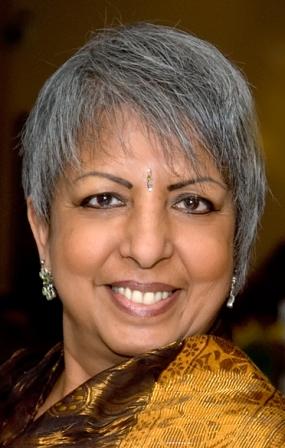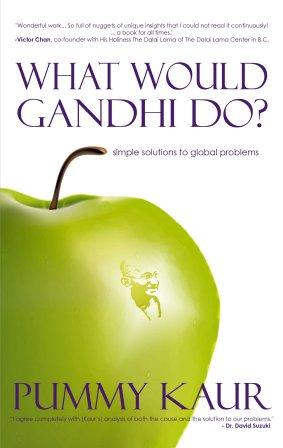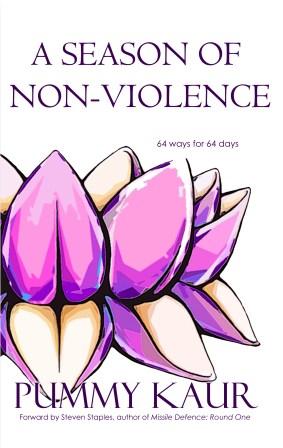In Vancouver, BC Tune in every Wednesday 6 – 7 PM to CFRO – 100.5 FM
Anywhere in the world by Stream, Satellite, TelusTv - How to Listen
Only last 10 shows are available to listen to for free - REGISTER NOW. Supporting Members have unlimited access to this and hundreds of other life changing programs - Click Here to sign-up
 Pummy Kaur (pronounced like “yummy” with a “P” and “core”), the author of the best selling What Would Gandhi Do? Simple Solutions to Global Problems, was born in India into a Sikh family, living in a Hindu state with a long history of Muslim influence, and completed elementary schooling in a Catholic convent in Agra. She has since lived, learned, worked, played and grown in England, Canada, The Bahamas, Australia and the U.S.A., as well as travelled to many countries.
Pummy Kaur (pronounced like “yummy” with a “P” and “core”), the author of the best selling What Would Gandhi Do? Simple Solutions to Global Problems, was born in India into a Sikh family, living in a Hindu state with a long history of Muslim influence, and completed elementary schooling in a Catholic convent in Agra. She has since lived, learned, worked, played and grown in England, Canada, The Bahamas, Australia and the U.S.A., as well as travelled to many countries.
Her extensive studies include science, religion, mathematics, psychology, global issues, metaphysics, spirituality, philosophy, creativity, and education. Kaur is a cultural creative, an educator, author, social justice activist, international speaker, dancer, a single mother of three, and a community leader who has also dabbled in radio, T.V., the art world, politics, and journalism, receiving numerous recognition for her work in various fields.
She is the Director of the Global Education Center, dedicated to education for living as if Life really matters. A frequent speaker at international conferences and regularly contributor to progressive journal, she is a very busy social justice activist, and an Argentine tango addict. Pummy Kaur lives on the West coast of B.C., Canada within arms reach of her three adored adult children.

This very timely book clearly, and succinctly demonstrates that most current local and global problems are immediately reversible, without government, business, industry or financial sector assistance. What is needed is the active will of the Western Minded to stop being so very lazy, so very addicted to convenience, and so very brainwashed by the Trash Media.
It contains unique insights and perspectives, and offers simple, highly effective, individual solutions to local and global problems; solutions that are congruent with Gandhian Principles of simplicity, seva (service), self-sufficiency, courage, and compassion. A notable feature is that much of the responsibility is placed on all our collective shoulders for the creation, and also the solving of global problems. In a simple, yet passionate style of a genuine educator, this work connects the dots between global problems and our individual choices. And, most significantly, it inspires educated, selfless, future conscious, compassionate individual actions.
This book is for those wanting to be better people, making a better world for all. This is a must read for ages eight to ninety eight, on all topics of social justice, including child rearing, diet, education, war, feminism, world hunger, nuclear weapons amassment, burial practices and much more.

Pummy Kaur’s book supplies the reader with sixty-four suggestions, which are intended to be contemplated, and implemented into their lives during the Season of Non-Violence. These sixty-four suggestions provide the reader with the means necessary to bring peace into their own lives. It is only when peace is realized in the individual that global peace can be realized.
Kaur demonstrates to us that through our everyday actions and choices we as individuals indirectly perpetuate war and oppression. Her forceful assertions may themselves seem combative, disrupting the image that we hold of ourselves as peaceful and peace-promoting individuals. But Kaur’s words can function as a challenge – a challenge for each of us to start taking responsibility for our actions.
Take the example of bottled water. When we buy a bottle of water we are purchasing the resources that make up that plastic bottle. Plastic is made from petroleum. Thus we are indirectly supporting the petroleum industry. Taking the argument one step further, we are indirectly supporting the continued occupation and invasion of petroleum-rich countries.
This is a powerful argument: it places responsibility and accountability upon the global citizenry for the atrocities we see today. Upon reading this book, the reader may no longer be able to assume distance from the wars splashed upon their television screen. The individual may find it harder to blame wars wholly on corporations, tyrannical governments, and greedy leaders. This may provide the impetus necessary for fostering global peace, as peace, asserted by Kaur, starts with the individual.

You must be logged in to post a comment Login